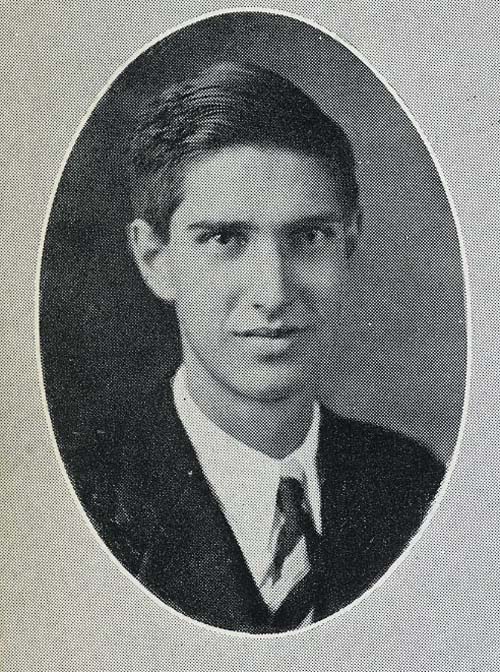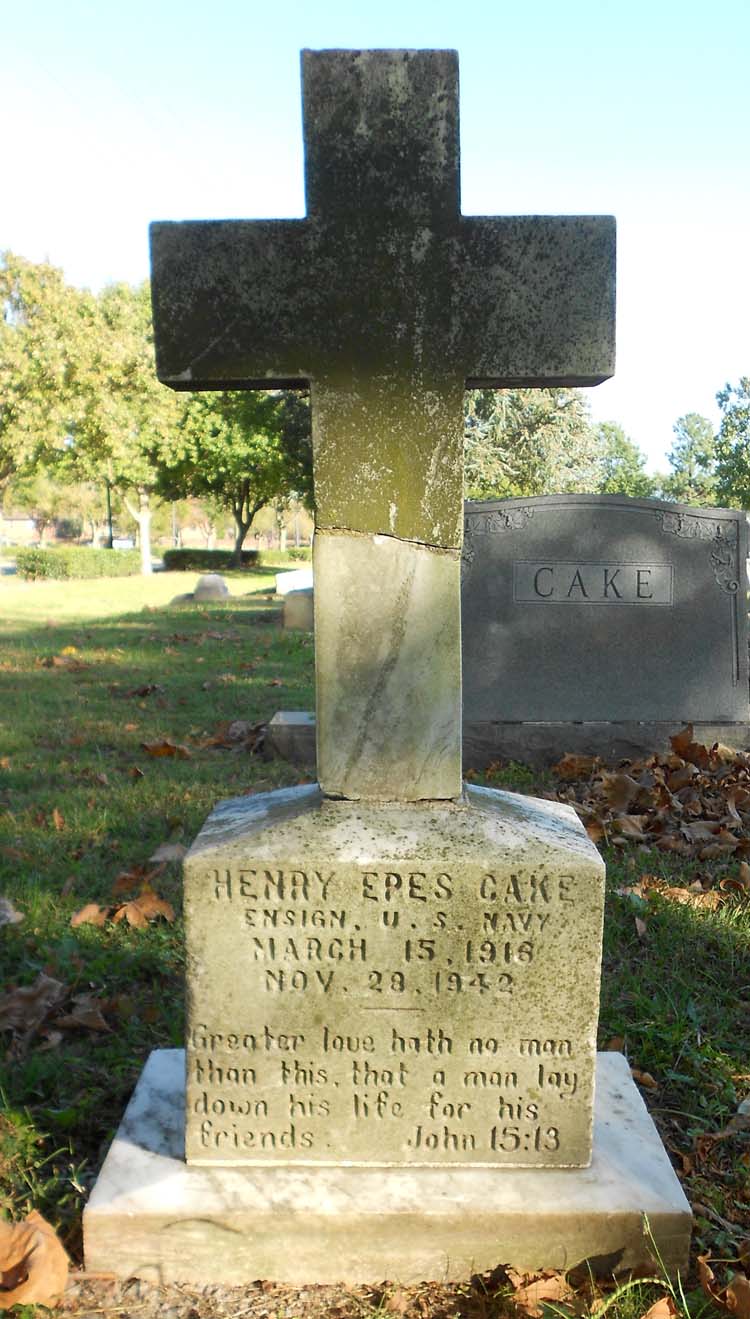Historical
Reminiscing with Robert B. Hitchings
Copyright.
All rights reserved.
Henry Epes Cake, Ensign, US Navy, 1916-1942
Greater love hath no man
Than this, that a man lay
Down his life for his friends.
John 15:13Walking through an old cemetery like Cedar Grove cemetery in Norfolk, Virginia, can be very rewarding.
A few years ago I was strolling through Cedar Grove and came upon a cross-like tombstone of a man named Henry Eps Cake. On the stone was this Bibical inscription, an epitaph that quickly caught my eye. I decided to look into this young man’s life who passed away at a very young age.
Epitaphs are a very meaningful way to remember loved ones, a tribute to that special person that has passed away. It’s these grave stones that remember the dead by honoring their lives. And it is epitaphs that sums up one’s life experiences, and this epitaph of Ensign Henry Cake is one that summed up his last hours of his life.
I was horrified when I pulled up Henry Cake’s obituary, for he had died in the Boston, Massachuttes, Coconut Grove Night Club fire on November 28, 1942. This fire would be the second deadliest single-building fire in US history claiming 492 lives. And this was a Thanksgiving weekend.
The Coconut Grove Night Club was one of Boston’s most popular nightspots, attracting many celebrities across our land. The “Grove” was the place to be seen featuring good food, floor shows, and lots of dancing to the big Band Sounds. Like a lot of night clubs, fire regulations had not been totally observed. Inside the Grove were huge, painted palm trees which were highly flammable. Even the air-conditioner unit used a flammable gas because freon was in short supply because of World War II. To make matters worse, the doors had been locked by the owner to prevent unwelcome non-paying guests.
That Thanksgiving weekend was the first Thanksgiving weekend since the U.S. had entered World War II. The Grove was filled to twice its capacity. That same day Boston College football game ranked #1 to Holy Cross College at Fenway Park. In a great upset, Holy Cross beat Boston College by a score of 55-12. Boston College quickly cancelled its plans to party at the Grove and all the sports fans of Holy Cross College were eager to celebrate their great victory and booked the Coconut Grove to have its victory celebration.
Around 10:15 PM, a young man unscrewed a light bulb in coconut-styled sconce benenth the palm leaves or fronds. A young bus-boy (under age) had been instructed to put the light back on by tightening the bulb. Because of the darkness, this young bus-boy lit a match to see.
Witnesses remembered that he immediately extinguished the match. However, several minutes’ later witnesses saw flames spreading rapidly on the fabric-covered false ceiling and palm decorations showering customers with sparks. Waiters quickly tried to douse the fire out with water, but it spread too fast. Before everyone’s eyes, a fireball burst near the front entryway of Coconut Grove, causing much panic. People tried to get out, but the doors were all locked. Within a few minutes the Coconut Grove Night Club had become an inferno.
Ensign Cake who was just 26 years old was one of the victims of the Boston night club fire. He was the son of Mrs. Lena D. Cake of West Fiftieth Street, Norfolk, Virginia, and W.P. Cake of Miami, Florida. He had recently graduated from Maury High School in 1934 and after working for three years had saved up enough money to enter the University of Richmond. There he had received his bachelor’s degree in education in June 1941. However, in January 1942 he enlisted in the U.S. Naval Reserve and was sent for training to Northwestern University, being commissioned as an ensign upon completion of his courses. He was assigned to his ship Sand and his family and friends last saw him when he sailed away on June 13, 1942. Henry Cake was unmarried and a member of the First Baptist Church, Norfolk.
Music was a great part of Henry Cake’s life. He was a member of the choir of First Baptist church. He was also a member of the choir of the University of Richmond. He sang bass and as a tribute to Ensign Henry Cake’s death, the University of Richmond choir dedicated its annual Christmas program in his memory.
He sang bass at several churches locally and on November 9, 1941, and he and a few choir members sang with the African American Choir of First Baptist Church here in Norfolk, with bass singer Edgar M. Hitchings, (1912-1985) my father’s cousin.
His funeral was large and many friends and relatives turned out for the service at the Twiford Funeral Home. One of the songs they sang in the chapel was Shadows, an old Baptist hymn that was one of his favorites. And after the grave-side service in Cedar Grove cemetery, one could hear taps playing in the distance.
According to his nephew, he had been invited by some of his shipmates to attend the Coconut Grove night club. We do not know the circumstances that night in the inferno, but his epitaph says it all. Ensign Cake in some way was a hero that night and probably tried to save several of his friends. We may never know the true story, but this epitaph speaks well of this Norfolk man, a man named Ensign Henry Eps Cake.
Robert B. Hitchings is a seventh generation Norfolk resident, graduating with an Associate's Degree in Biology from Old Dominion University and BA in history from Virginia Wesleyan University. During his studies he was awarded a scholarship at Emmanuel College, Cambridge, England, and he was an exchange student at Brooks-Westminster College, Oxford, England. From 1999-2014 he worked as head of the Sargeant Memorial History Room at Norfolk Public Library, and since then has headed the Wallace History Room at Chesapeake Public Library. He is also the President of the Norfolk County Historical Society, and for six years was a columnist for The Virginian-Pilot. Robert may be reached at nchs.wallaceroom@gmail.com

